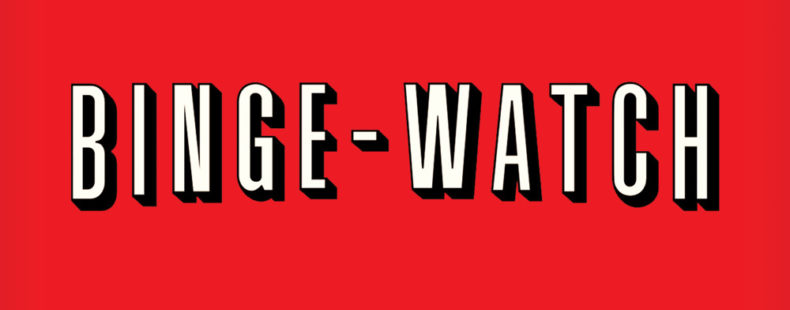WATCH: How Can The Word "Bingeing" Be Offensive?
The 12 episodes of the Netflix show that you watched on Saturday.
The full pint of Ben & Jerry’s you ate last Thursday night.
The entire series of books you read in one week.
When we enjoy things, it’s normal for us to indulge in them. There’s even a handy little word we pull out just for these instances of indulging in something we love: binge. We binge-watch. We binge-eat. We binge-read. We even binge-listen to hit podcasts like Serial or Dirty John.Binge, here, is usually meant to be positive, if excessive, expressing that we like something so much we gobble it up all at once. But, there are growing concerns that such uses of binge may be making light of serious disorders.
What does it mean to binge?
First recorded in the mid-1800s, binge is said to be an English dialectical word for “soaking a wooden vessel,” such that the wood expands to prevent leaks. By 1854, we find binge as a noun and verb extended to heavy drinking bouts, as if “soaking” the body with alcohol.
In the 20th century, binge was further applied to other forms of “excessive indulgence,” such as binge-eating, evidenced by the 1950s. While we may joke about bingeing on a bag of chips, bingeing is associated with disorders. Many people, for example, suffer from Binge-eating Disorder (BED), which the Mayo Clinic defines as “a serious eating disorder in which you frequently consume unusually large amounts of food and feel unable to stop eating.”
According to the National Eating Disorders Association, BED is the most common eating disorder in the United States. People who suffer from bulimia may purge after bingeing (and binge after purging), though BED, strictly speaking, isn’t marked by any purges.
The problem with using binge casually
When someone says they binge-watched (a term evidenced by 1998) the new season of Stranger Things, binge is being used as shorthand for choosing to watch multiple episodes of a show in a short amount of time, usually because you can’t wait to find out what happens next. The binge is a conscious indulgence, and it’s a fun one we all do and can relate to.
Similarly, if someone says they binged on doughnuts because they ate two out of the box in the break room at work, that’s a playful way of saying they treated themselves to something decadent.
But, binge eating is not just indulging in something, eating a little bit of junk food, or having a cheat day. Binge eating is excessively overeating in a way that makes you feel out of control and ashamed. People whose binge eating has progressed to a disorder also often hide food or eat in secret, frequently eating to the point of being uncomfortably full and associating eating with feelings of guilt and disgust.
The difference between an indulgence and a binge is importance, because BED has been an overlooked eating disorders. BED was first described as a mental health issue in the 1950s by psychiatrist Albert Stunkard, who referred to it as night-eating disorder. It has gone by Binge-eating Disorder since at least the 1980s.
In 1987, binge-eating was noted as a feature of bulimia, which, as the Binge Eating Disorder Association explains, meant it was not considered “unique enough to require specific treatment.” When something is not recognized as its own disorder in the DSM, it is not clinically legitimized in the health community.
It wasn’t until 2013 that BED was acknowledged on its own as a distinct, full-fledged eating disorder, treated and researched in the way that other mental health disorders are. Still, many with BED still struggle to have their disorders taken seriously, particularly because so many people associate eating disorders with being extremely thin and restricting food. This often means that those who are overweight—or even at an average weight—and struggle with bouts of extreme overeating aren’t always viewed as having a “real” disorder.
It matters how we talk about eating disorders
As a culture, we are no strangers to making light of eating disorders. Throughout the 1990s, the phrase gag me with a spoon, a reference to the act of making yourself throw up, was a popular way of expressing disgust. In the 2010s around Halloween, stores have sold “Anna Rexia” costumes (punning on anorexia) that involve a skeleton dress with a measuring tape for a belt.
When most of us use phrases like binge-watch or gag me with a spoon, we aren’t trying to cause harm. However, our willingness, inadvertent or not, to treat eating disorders, their symptoms, and their vocabulary as a joke means that the 30 million people in the US who suffer from some form of an eating disorder can feel stigmatized, made to feel like their conditions aren’t serious.
Thankfully, gag me with a spoon is not a popular thing to say anymore, and the makers of insensitive Halloween costumes are routinely called out—when not outright banned. So, what’s left is to move on from our collective fixation on the word binge. These words could provide a start:
A Netflix marathon can be just as good as a Netflix binge—and it doesn’t shame eating disorders.














